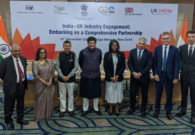Highlights from India’s ‘Interim Budget’ 2019
In a departure from usual pre-General Election procedure where the Budget is downgraded to a cordial ‘votes on account’, the Interim Finance Minister, Shri Piyush Goyal, sought to make an impact ahead of the polls by presenting an ‘Interim Budget’ on 1st February.

Little opportunity was lost by the Government to highlight its achievements over the last five years and appeal to constituencies who will be critical to winning the General Election.
In this UKIBC note on India’s Interim Budget, we summarise what the Government of India have presented as their record in power and their vision for the years ahead.
India’s economy after the Government’s five years in power
India now has claim to being the 6th largest economy in the world with promising high growth. In the last year, the Government saw an unprecedented 80% increase in tax collections, attracted £180 billion in FDI in the last five years, and boasted a 3.4% fiscal deficit. In short, the fundamentals look good. However, this was against reported (though unconfirmed) suggestions that unemployment stands at 6.1% nationally – the highest in half a century.
According to Mr Goyal (standing-in for Arun Jaitley, who is in the US for medical treatment), strong fundamentals, a stable regulatory regime, and reforms such the Goods and Services Tax (GST) India managed to attract £180 billion in FDI during in last five years.
Below, we provide some of the key points made by Mr Goyal.
Tax-Receipts
India’s tax base has widened and its tax revenues increased:
- Tax collections increased from £68 billion in 2013-14 to almost £128 billion this year, representing a staggering 80% growth in the tax base.
- The number of returns filed also increased from 37.9 million to 68.5 million.
- Anti-black money measures brought an undisclosed income estimated to be around £14 billion into the tax system.
- 6 million new people filed Income tax Returns (ITR) for first time mainly on account of demonetization.
Fiscal Deficit and Inflation
- The fiscal deficit has been brought down to 3.4% in 2018-19. This is a slight increase of 0.1% on targets, but a significant improvement on revised estimates of 5.8% in 2011-12 and 4.9 % in 2012-13.
- Average inflation has been brought down to 4.6% from the high of 10.1% during 2000-2014, however, this is markedly up from 2.19% in December 2018.
- Current Account Deficit (CAD) is predicted to be only 2.5% of GDP this year, against a high of 5.6% six years ago.
Recovery of Bank Loans
- The Insolvency and Bankruptcy Code has institutionalised a resolution-friendly mechanism and nearly £32 billion has been recovered by Banks and creditors.
- High stressed non-performing assets (NPAs) amounted for £58 billion in 2014. Since 2015, numerous Asset Quality Reviews and inspections were carried out, and the ‘4Rs’ approach of recognition, resolution, re-capitalisation and reforms has been followed.
- Highlighting the restoration of the health of the Public Sector Banks, the Finance Minister said that recapitalisation has been done with an investment of £28 billion.
Social achievements
- A 98% rural sanitation coverage with 545,000 villages now having access to sanitation facilities.
- 15 million houses have been constructed under the Government’s Pradhan Mantri Awas Yojna scheme.
- In 2014 when the Government came to power, 25 million people were without electricity, now they are on target to ensuring everyone who wants the electricity connection will have one by March 2019.
The Government’s Vision beyond the ‘Interim’
The Mr Goyal made a firm statement as to BJP’s General Election ambitions, proposing a Vision 2030.
This 2030 vision is bold, resting on 10 key dimensions that aim to build social and physical infrastructure, including next generation infrastructure for roads, railways, sea-ports, inland waterways, and ensuring every family will have a roof on their head and live in healthy, clean, wholesome environment.
The Ten-point vision set out by Mr Goyal is:
- To build next-generation infrastructure – physical as well as social – for a £7.5 trillion economy centred around improving the ease of business and living.
- To build a Digital India that reaches every citizen driven by youth orientated start-ups and jobs.
- Clean and Green India – an India that drives electric vehicles, with renewables becoming major source of energy, bringing down import dependence and increasing energy security. India promises to lead the world in the transport revolution through electric vehicles and energy storage devices.
- Expanding rural industrialisation using modern industrial technologies, based on Make in India approach, using grassroots MSMEs and start-ups across the country.
- Clean Rivers – with safe drinking water to all Indians, sustaining and nourishing life, using micro-irrigation techniques.
- Focussing on utilising India’s oceans and coastlines, using strength of blue economy and Sagar Mala.
- India becoming a launchpad of the world, placing an Indian astronaut in space by 2022.
- Self-sufficiency in food and improving agricultural productivity with an emphasis on organic food.
- Healthy India – developing nationwide healthcare infrastructure and a wellness system.
- Proactive and responsible bureaucracy.
Beyond the high-level 2030 vision, the Government offered more immediate promises, summerised below:
Technology, Defence and Infrastructure
- In order to make the most of Artificial Intelligence and related technologies, a National Programme on ‘Artificial Intelligence’ has been proposed by the Government. This would be kick-started by the creation of a ‘National Centre on Artificial Intelligence’ and a ‘National Artificial Intelligence Portal’ as key hubs along with the development of several Centres of Excellence.
- £32 billion has been allocated to the Defence budget and additional funds will be provided if needed for border security.
- More than 100 Airports to be constructed with a further £17 billion allocated for the Railways, the highest ever, in an effort to put flagging rail revenues back on track.
Tax relief for the middle class
- A huge tax relief has been offered to India’s middle classes in the form of access to a full tax rebate for those with incomes below £5,300.
Support for Micro, Small and Medium Sized Enterprises
- Within the next two years, almost all verification and assessment of returns selected for audit will be done
- The Government’s eMarketplace (GeM) is to be extended to all CPSES and all Government undertakings to procure a fixed proportion of materials from women owned SMEs.
- The launch of a scheme sanctioning loans of up to £100,000 in under an hour, a 2% interest rebate on incremental loans of £110,000 for GST-Registered SME units, and a commitment to source 25% of all Government Undertakings procurement from SMEs (of this, at least 3% must be sourced from women owned SMEs).
Rural India and the Unorganised Sector
- Appealing to the 80% of employed Indians who work in the ‘unorganised’ sector, the Government announced the launch of a ‘mega’ pension scheme called the ‘Pradhan Mantri Shram-Yogi Maandhan’ for unorganised sector workers with monthly income under £150, standing to benefit 100 million labourers and workers in the sector.
- Farmers with less than 2 hectares of land will be given £65 per annum in income support across three instalments to purchase necessary equipment to improve output.
Comment
This a bold ‘Interim Budget’ putting forward a considerable election-focused offer to as many constituencies as the Government feels are needed to swing the election.
The main parties are now clearly out the starting-blocks – what now remains to be seen is if this will be enough to push Modi’s BJP over the finish line in what promises to be a hotly contested election.
The UKIBC will be following the General Election closely for our members and analysing in a series of thought-leadership blogs and events what lays in store for UK businesses.







